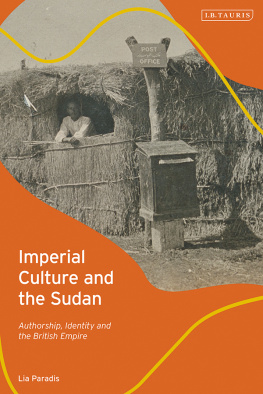First published in 2001 by
FRANK CASS PUBLISHERS
Published 2013 by Routledge
2 Park Square, Milton Park, Abingdon, Oxon OX14 4RN
711 Third Avenue, New York, NY, 10017, USA
Routledge is an imprint of the Taylor & Francis Group, an informa business
Copyright 2001 A. Moore-Harell
British Library Cataloguing in Publication Data
Moore-Harell, Alice
Gordon and the Sudan: prologue to the Mahdiyya, 18771880
1. Gordon, Charles George, 18331885 2. Sudan History 18621899 3. Sudan Politics and government
I. Title
962.4'03'092
Library of Congress Cataloguing-in-Publication Data
Moore-Harell, Alice, 1952
Gordon and the Sudan: prologue to the Mahdiyya, 18771880/Alice Moore-Harell.
p. cm.
Includes bibliographical references and index.
1. SudanHistory18211881. 2. SudanHistory18811899. 3. Gordon, Charles George, 18331885. I. Title.
DT156.6.M66 2001
962.4'03dc21
00-034575
ISBN 13: 978-0-714-65081-4 (hbk)
All rights reserved. No part of this publication may be reproduced, stored in or introduced into a retrieval system, or transmitted, in any form or by any means, electronic, mechanical, photocopying, recording or otherwise without the prior written permission of the publisher of this book.
Typeset by Vitaset, Paddock Wood, Kent
On 24 January 1985 Richard Hill presented a paper at the University of Durham to commemorate the centenary of Major-General Charles George Gordons death at Khartoum. In his opening remarks he stated:
General Gordon has been dead over a hundred years but his bibliography goes marching on. The sheer bulk of printed literature devoted to his person and his activities, published since the night of 19 January 1884, when he set out from London on his last and fatal mission to the Sudan, places him among the most publicised of eminent Victorians.1
An obvious reaction to this quote may therefore be: why is another book on Gordon required? This was also my own feeling when Alice Moore-Harell approached me and suggested devoting her PhD thesis to yet another study of Gordon. But I soon discovered that her study, devoted to Gordons governor-generalship of the Sudan in the years 187780, involved an important chapter in Gordons biography which had hitherto been neglected by historians. Most of what became known as the Gordon literature was devoted to the more exciting period of his life, namely his final mission to Khartoum undertaken at the behest of Whitehall, in January 1884. He was then sent to try and save whatever was possible of the Egyptian Sudan, following the Mahdis spectacular victories over the armies which attempted to stop him, culminating in his great victory over the Egyptian expeditionary force, commanded by Colonel Hicks, on 5 November 1883. Gordons earlier career in Sudan, though mentioned and praised, had never been fully researched. This has now been remedied and Dr Moore-Harells addition to the Gordon literature is therefore the most welcome.
Gordon, not unlike other Europeans who served in the Ottoman Empire, came to the Egyptian Sudan with military and administrative experience gained in the Crimean War, China and elsewhere which really had little to do with the conditions prevailing in the Sudan. His lack of appreciation of local conditions, his ignorance regarding Islam and his missionary zeal were not conducive to his promoting a realistic policy. This ignorance was shared by many Europeans serving in nineteenth-century Sudan, but Gordons case was the most famous and probably the most fatal. Describing his mission to Sudan in 1887, when he was appointed governor-general by the Khedive Ismail following the Khedives conclusion of the Slave Trade Convention with Great Britain, Gordon wrote:
I have no easy task before me, but I have resolved the difficulty You have little idea of the great difficulty and the many questions involved in it, viz. in domestic slavery Consider the effect of harsh measures among the essentially Musulman population carried out brusquely by a Nazarene, measures that touch the pocket of everyone. Who, that had not the almighty with him would dare do that? I will do it, for I value my life as nought As Solomon asked, I ask Wisdom to govern this great people; and not only will he give it, but all else besides. And why? Because I value not the all besides. I am quite as averse to slavery, and even more so, than most people. I show it by sacrificing myself in these lands, which are no paradise I do what I think is pleasing to my God.2
This emphasis on slavery as the central issue, is not surprising since it had become a main topic of concern for British colonial policy-makers in the second half of the nineteenth century. This also explains why most of Gordons biographers emphasise slavery and missionary proselytising. Alice Moore-Harell, on the other hand, devotes the first three chapters of her book to Sudans relations with Egypt and Europe, its administration and its economy and taxation, all topics of immense importance which have been largely ignored by her predecessors. Only in does she deal with religion and slavery, both of greater concern to European audiences, under the heading Social Policy, where she also discusses the administration or law, education and health.
The fact that slavery and religion were emphasised by Gordons biographers was no coincidence, since, as noted, the suppression of the slave raids and of slave trade were highlighted by the imperial powers. However, there is no doubt that the appointment of European Christians, such as Gordon, Gessi, Slatin and others, to suppress slavery, was an unrealistic and gravely misguided step. It not only aroused the hostility of the slave-traders, their allies and their private armies, but disrupted the fabric of Muslim Sudanese society, which depended heavily on slavery for its existence. It also caused jealousy among the Egyptian officials, whose integrity and standing were undermined by these appointments. The realisation that this policy had to be reversed, and that a much more cautious and tactful way to end slavery had to be found, did not take place until the Mahdist revolt was well under way. One of the first to realise that policies had to be revised was Gordon himself, who proclaimed in 1884, on his way to Khartoum to undertake his final mission, that:
knowing of the general regret caused by the severe measures of the Government for the suppression of the slave traffic he had resolved that none should interfere with their property, and that henceforth whoever had slaves should enjoy full right to their service and full control over them.3
But it was too late, and Naum Shuqayr, a Lebanese serving as one of Reginald Wingates chief assistants in the Egyptian Department of Intelligence during the conquest of Sudan in 189698, rightly singled out the suppression of slavery as one of the main reasons for the success of the Mahdist revolt. He emphasised the importance of slavery in the socio-economic fabric of Sudan and stated that the suppression of slavery, an institution sanctioned by the sharia, by Christian European officials serving under Khedive Ismail, was a grave mistake.4






